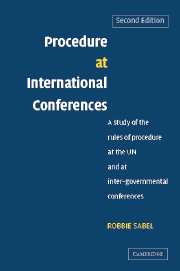 Procedure at International Conferences
Procedure at International Conferences Book contents
- Frontmatter
- Contents
- Preface to the second edition
- List of abbreviations and conference references
- Introduction
- 1 Historical development of rules of procedure of conferences and attempts to establish model rules
- 2 Adoption of rules of procedure
- 3 Rules of procedure and international law
- 4 Invitations, participation and credentials
- 5 Presiding officer and other officers of the conference
- 6 Meetings
- 7 Statements by delegations
- 8 Submission of proposals
- 9 Adjournment and closure of debate
- 10 Amendments
- 11 Withdrawal and reconsideration of motions
- 12 Procedural motions and points of order
- 13 Priorities between different proposals
- 14 Decision taking and method of voting
- 15 Majority required
- 16 Consensus
- 17 Separate votes
- 18 Conduct of voting – interruption of voting and correction of vote
- 19 Languages, records and documents
- 20 Committees
- 21 Suspension and amendment of rules of procedure
- Bibliography
- Index
14 - Decision taking and method of voting
Published online by Cambridge University Press: 22 July 2009
- Frontmatter
- Contents
- Preface to the second edition
- List of abbreviations and conference references
- Introduction
- 1 Historical development of rules of procedure of conferences and attempts to establish model rules
- 2 Adoption of rules of procedure
- 3 Rules of procedure and international law
- 4 Invitations, participation and credentials
- 5 Presiding officer and other officers of the conference
- 6 Meetings
- 7 Statements by delegations
- 8 Submission of proposals
- 9 Adjournment and closure of debate
- 10 Amendments
- 11 Withdrawal and reconsideration of motions
- 12 Procedural motions and points of order
- 13 Priorities between different proposals
- 14 Decision taking and method of voting
- 15 Majority required
- 16 Consensus
- 17 Separate votes
- 18 Conduct of voting – interruption of voting and correction of vote
- 19 Languages, records and documents
- 20 Committees
- 21 Suspension and amendment of rules of procedure
- Bibliography
- Index
Summary
Determining the issue to be voted on
Reading out proposals or amendments prior to the vote
At the 1974–77 Geneva Humanitarian Law Conference, the representative of Libya requested that ‘each article be read out before a vote was taken, in order to identify clearly the article on which representatives were voting’. The representative of Canada commented that ‘it was true that at certain conferences where perhaps there were not so many articles to be considered articles were read out before the vote … As a rule, an article should not be read out before the vote unless a representative specially asked for it.’ The President accepted the Canadian proposal and the Conference acted accordingly.
Declarations as part of a decision?
At a 2002 meeting of the Council of the IMO, a representative requested that ‘comments made expressing discontent with the [issue decided] should also be reflected in the summary of decisions’. In support of this request it was argued that ‘a proposal made by one delegation and supported by another delegation, and which had not been opposed, should constitute a decision of the Council’. The Secretary-General of the IMO responded that ‘those comments did not constitute a decision and would be covered in the summary record’. The Chairman adopted the position of the Secretary-General and proposed to the Council that it ‘note’ the comments ‘as reflected in the summary records’.
Information
- Type
- Chapter
- Information
- Procedure at International ConferencesA Study of the Rules of Procedure at the UN and at Inter-governmental Conferences, pp. 285 - 311Publisher: Cambridge University PressPrint publication year: 2006